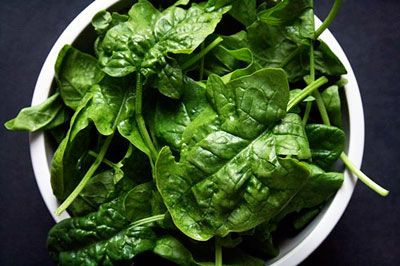E. Coli Contamination Found In 7% Of Spinach Harvests, How Can You Prevent Food Poisoning?

Each year, 48 million people are made sick by food poisoning. Food poisoning is often caused by bacteria present in foods that are undercooked or not cooked at all. Fruits and vegetables are often consumed raw and this is essentially a major way some incidences of food poisoning occur.
Recently, fruits and vegetables have been found to be contaminated by E. coli, Salmonella and Listeria toxins. Each of these are especially deadly when found on plants, as they are often not cooked or washed properly before consumption. However, while Listeria contamination of plants is common, Salmonella and E. coli contaminations are more likely to occur in animal products like poultry and beef.
In a new study, researchers set out to find the cause for the presence of E. coli in spinach across 12 farms in the Western and southwestern United States. The spinach from each farm was checked for E. coli and the farm hands were given questionnaires about their personal hygiene as well as practices on the farm.
Researchers found that 7 percent of the spinach studied was contaminated by E. coli. While seven percent is a low number, it can still cause sickness across the country, as the farms send their crops elsewhere for sale. Contamination of the spinach was increased by 172 times if the farm was within 10 miles of a poultry farm, and 64 times more likely to be contaminated if the farm was irrigated by pond water.
Similarly, if the spinach is grown for 66 days or longer, its likelihood of contamination with E. coli increases to three incidences for each spinach plant — the contaminated plants had been grown an average of 77 days.
Although this information may sound dire, the researchers identified ways in which the likelihood of contamination could be reduced. The results indicated that if the farm had been irrigated for five or fewer days, it does not have much risk for E. coli contamination since the water would continue to flow and the organisms in it, like E. coli, would not be able to affect the plants. Similarly, if portable lavatories were closer to the fields, there were fewer incidences of E. coli contamination, as workers could relieve themselves and wash their hands in appropriate places. The farms with no contamination had bathrooms an average of 185 meters away from fields, while the farms with contamination had bathrooms an average of 215 meters away from the fields. Also, they found that presence of E. coli was reduced if the farm was close to a railroad or forest.
Surprisingly, the use of manure as fertilizer made no difference in E. coli contaminations. E. coli is often found in fecal matter in most animals. The study established that all manure containing fecal matter was aged up to 90 days before use. The aging reduced E. coli's potential to effectively contaminate the spinach or other plants.
However, consumers do not have to rely on farmers and workers to keep their produce clean. The Centers for Disease Control and Prevention have outlined a few rules for food safety:
1. Wash your hands before handling foods, and keep utensils, cutting boards, and containers clean.
2. Rinse fruits and vegetables under cool running water.
3. Separate raw meats from produce before they are cooked together.
4. Cook and chill foods at appropriate temperatures if storing. Meats ought to be cooked at 160°F, and all food should be stored at 40°F and lower.
From this study, researchers have established that contamination of produce can be avoided by changes in farm practices, farm worker's personal hygiene practices, and thoroughly cleaning and cooking vegatables like spinach.
Source: Park S, Navratil S, Gregory A, et al. Generic Escherichia coli Contamination of Spinach at the Preharvest Stage: Effects of Farm Management and Environmental Factors. Applied and Environmental Microbiology. 2013.



























